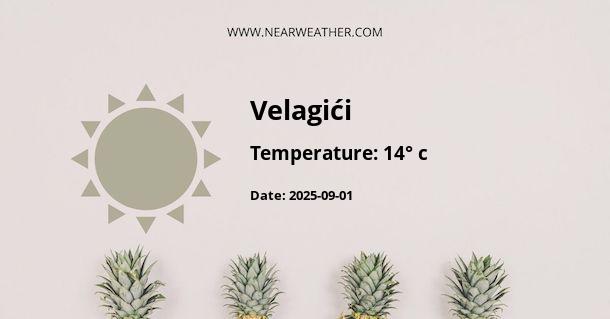Understanding the Climate and Weather of Velagići, Bosnia and Herzegovina
Villages like Velagići in Bosnia and Herzegovina showcase a blend of continental and Mediterranean climate influences, owing to the country's geographic situation in the heart of the Balkan Peninsula. Velagići, nestled within the diverse landscapes of the region, offers a unique climate profile that demands detailed exploration.
The Climate Characteristics of Velagići
The climate in Velagići is characterized by cold winters and warm, occasionally hot summers, which is typical of a humid continental climate as classified under the Köppen climate classification Dfb. This section will dissect the year-round weather specifics for Velagići, providing an in-depth snapshot for each season.
Winter in Velagići
Winters can be brisk, with temperatures often ranging from sub-zero lows to about 5°C (41°F) during daytime. Snowfall is common, adding to the picturesque landscape of Velagići, but also requiring appropriate preparations for daily life and transportation.
According to statistics, average snowfall in Velagići can range anywhere from 20 to 70 cm (8 to 28 inches) per year, with January typically being the coldest month.
Spring in Velagići
Spring ushers in a gradual warming trend. Early spring can still be chilly and unpredictable with possible late snows in March, but by May, the temperatures are more comfortable, ranging from 10 to 20°C (50 to 68°F). This period is characterized by the rejuvenation of the local flora, making it a pleasant time for outdoor activities.
Expert tip: Spring is the season of transition in Velagići, hence it's best to be prepared for fluctuating temperatures.
Summer in Velagići
Summers are warm and can often be hot, with daytime temperatures frequently climbing above 25°C (77°F), and occasionally peaking at around 30°C (86°F) or more. Although the summer is generally sunny and dry, short but heavy thunderstorms can occur, affecting the humidity levels and overall comfort.
Historical data indicates that July and August are the hottest months in Velagići, with the highest likelihood of heatwaves.
Autumn in Velagići
Autumn, similar to spring, is a transitional season with diminishing temperatures and increasing precipitation. Early autumn still retains some of the warmth of summer, but by late October and November, colder weather sets in, paving the way for winter.
- September: Comfortably warm days, cooler nights
- October: Noticeable drop in temperatures; increased rainfall
- November: Cold and often foggy; preparation for winter begins
Precipitation and Humidity
Rainfall in Velagići is relatively well-distributed throughout the year, with no distinct dry season. The wettest months are commonly in the spring and autumn, which aligns with the pattern of a humid continental climate. Whereas, the summer months tend to be drier, although the rain that does occur often comes as heavy thunderstorms.
| Month | Average Precipitation (mm) |
|---|---|
| January | 70 |
| February | 65 |
| March | 70 |
| April | 80 |
| May | 85 |
| June | 90 |
| July | 80 |
| August | 70 |
| September | 85 |
| October | 100 |
| November | 110 |
| December | 90 |
The humidity levels in Velagići can vary, but the moisture-laden air primarily during the cooler seasons can lead to fogs, particularly in the valleys and along river plains. Moist winds from the Mediterranean can at times amplify humidity levels during the year.
Understanding Wind Patterns and Sunlight
Wind patterns in Velagići fluctuate with the seasons. The winters may bring brisk, northern winds, while summers see lighter winds predominantly from the south. The average sunlight hours peak in the summer months, with an appreciable lengthening of days, while winter brings shorter days with limited sun exposure.
To optimize outdoor activities and tourism in Velagići, it is advisable to factor in both the wind patterns and sunlight hours when planning.
Climate Adaptations and Local Living
Residents of Velagići have historically adapted to the demands of the local climate. From architecture designed to withstand the cold winters and retain coolness in the summer to agricultural practices aligned with the seasonal weather patterns, climate has shaped the way of life here.
- Housing often includes features like insulation, central heating, and sturdy materials to protect against winter storms.
- Seasonal closets are a must, with heavy coats and boots for the winter, and lighter attire for the warmer months.
- Local cuisine reflects seasonal changes, with heartier meals in the cold weather and lighter fare during summer.
Expert Opinions and Forecasting
Climate experts predict that Velagići, alongside the broader region, may experience shifts in climate patterns due to global warming. This could manifest as hotter and potentially longer summers, milder winters, and shifts in precipitation frequencies, which could have implications for local agriculture, biodiversity, and water resources.
Conclusion
Exploring the climate and weather of Velagići reveals a region with distinct seasonal variation, each bringing its own beauty and challenges, from snowy winters to balmy summers. Understanding these patterns is crucial for residents and travelers alike to align their activities with the rhythms of nature. As global climate trends impact local weather phenomena, ongoing observation and adaptation will become increasingly important.
Whether you're considering a visit to this charming village or looking to understand the nuances of Balkan climate, Velagići offers a rich tapestry of weather patterns that are both a testament to the region's natural diversity and an invitation to experience its unique year-round climate dynamics.
A - Velagići's Latitude is 44.557220 & Longitude is 16.731670.
A - Weather in Velagići is 13° today.
A - Climate Conditions in Velagići shows overcast clouds today.
A - Humidity in Velagići is 44% today.
A - Wind speed in Velagići is 1.84 km/h, flowing at 260° wind direction. today.
